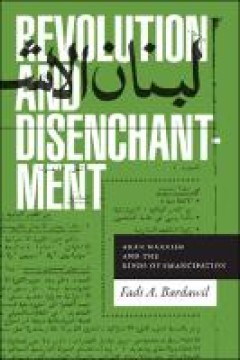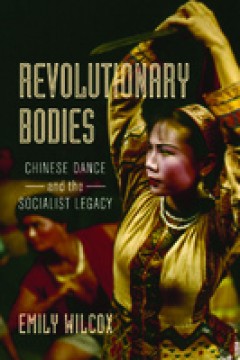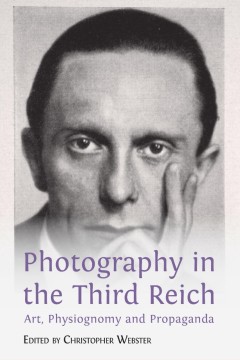Filter by

Writing The Digital History Of Nazi Germany
This book will consider how the outcomes of “doing history digitally” include different kind of sources and data, as well as new ways of researching historical questions, and innovative forms of presenting history. All contributions focus on aspects related to the history of National Socialism, World War II and the Holocaust.
- Edition
- -
- ISBN/ISSN
- 9783110714692
- Collation
- -
- Series Title
- -
- Call Number
- Berlin/Boston

Revolution and disenchantment : arab marxism and the binds of emancipation
The Arab Revolutions that began in 2011 reignited interest in the question of theory and practice, imbuing it with a burning political urgency. In Revolution and Disenchantment Fadi A. Bardawil redescribes for our present how an earlier generation of revolutionaries, the 1960s Arab New Left, addressed this question. Bardawil excavates the long-lost archive of the Marxist organization Socialist …
- Edition
- edision 14
- ISBN/ISSN
- 9781478007586
- Collation
- xi. :281 p.
- Series Title
- -
- Call Number
- 320.5315095692. REV f

Revolutionary bodies: Chinese dance and the socialist legacy
This book examines the history of concert dance in China from 1935 to 2015, with a focus on Chinese dance and its relationship to revolutionary performance culture in PRC history. The book argues that Chinese dance, not revolutionary ballet, was the primary legacy of Maoist dance research and innovation. Showing the relationship between dance and politics, it discusses dance developments during…
- Edition
- edision 16
- ISBN/ISSN
- 9780520971905
- Collation
- xv, 305p.: ill.
- Series Title
- -
- Call Number
- 792.80951 WIL r

Photography in the Third Reich : art, physiognomy and propaganda
This lucid and comprehensive collection of essays by an international group of scholars constitutes a photo-historical survey of select photographers who embraced National Socialism during the Third Reich. These photographers developed and implemented physiognomic and ethnographic photography, and, through a Selbstgleichschaltung (a self-co-ordination with the regime), continued to practice as …
- Edition
- -
- ISBN/ISSN
- 9781783749164
- Collation
- xiii, 292p. ; ill.
- Series Title
- -
- Call Number
- 770.94309043 WEB p

Democracy, markets and the commons : towards a reconciliation of freedom and …
How can we overcome the existing political, economic, and ecological crises that humanity faces? With the notion of the commons, Lukas Peter argues that this form of social organization can provide answers to the shortcomings of centralized states and open and competitive markets. By building on and going beyond the work of Elinor and Vincent Ostrom, he develops an ecological understanding of t…
- Edition
- -
- ISBN/ISSN
- 9783839454244
- Collation
- 334 p. : ill.
- Series Title
- -
- Call Number
- 300 PET d

2050 China : becoming a great modern socialist country
This book is arranged and developed around the theme of “2050 China,” it analyzes the factors and advantages of the Chinese road to socialist modernization, explores and summarizes the development goal and the basic logic of the socialist modernization of China, and further shows the general basis of the primary stage of socialism. According to the report delivered at the 19th Party Congres…
- Edition
- -
- ISBN/ISSN
- 9789811598333
- Collation
- vi, 105p. : ill.
- Series Title
- -
- Call Number
- 320.95 TWO t

Socialism, capitalism and alternatives: area studies and global theories
In 1989 the Berlin Wall came down. Two years later the Soviet Union disintegrated. The collapse of communism in Eastern Europe and the Soviet Union discredited the idea of socialism for generations to come. It was seen as representing the final and irreversible victory of capitalism. This triumphal dominance was barely challenged until the 2008 financial crisis threw the Western world into a st…
- Edition
- -
- ISBN/ISSN
- 9781787353824
- Collation
- xvii, 234 p. :
- Series Title
- -
- Call Number
- 330.9 SOC s

Democracy and power: the Delhi lectures
"Noam Chomsky visited India in 1996 and 2001 and spoke on a wide range of subjects, from democracy and corporate propaganda to the nature of the world order and the role of intellectuals in society. He captivated audiences with his lucid challenge of dominant political analyses, the engaging style of his talks, and his commitment to social equality as well as individual freedom. Chomsky’s ear…
- Edition
- -
- ISBN/ISSN
- 9781783740949
- Collation
- 1 online resource (xviii, 171 pages)
- Series Title
- -
- Call Number
- 327.1 CHO d
 Computer Science, Information & General Works
Computer Science, Information & General Works  Philosophy & Psychology
Philosophy & Psychology  Religion
Religion  Social Sciences
Social Sciences  Language
Language  Pure Science
Pure Science  Applied Sciences
Applied Sciences  Art & Recreation
Art & Recreation  Literature
Literature  History & Geography
History & Geography